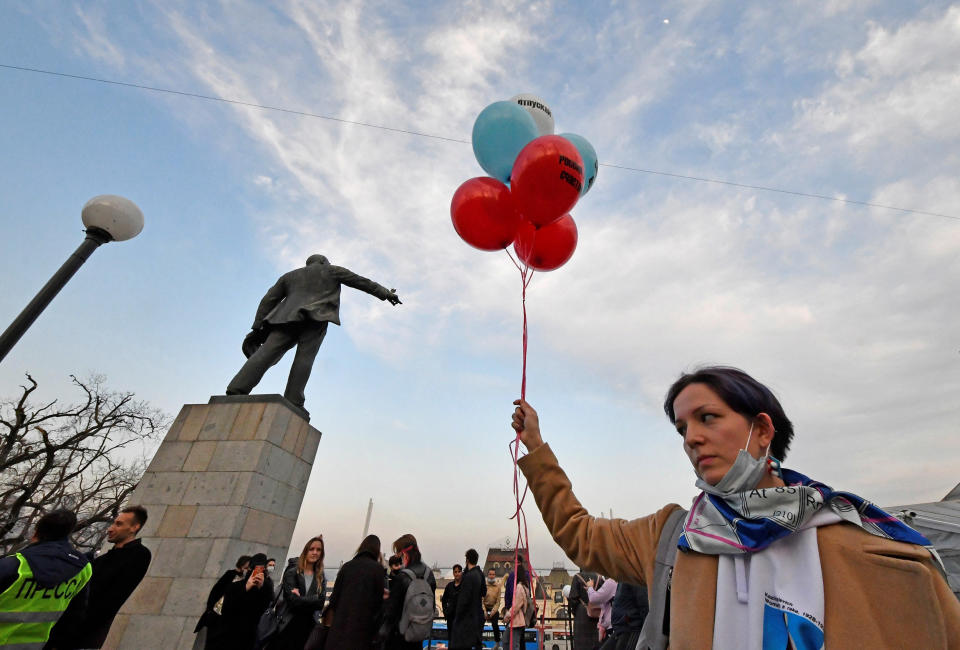Anyone who crosses Russia will come to regret it, Putin warns

- Oops!Something went wrong.Please try again later.
Moscow doesn't want "to burn bridges" with foreign partners but those who provoke it will come to regret it, Russian President Vladimir Putin said Wednesday.
Putin gave his annual state-of-the-nation address amid tensions with the West and national protests in support of jailed opposition leader Alexei Navalny.
Speaking in front of a crowd of socially-distanced political leaders, officials and celebrities, Putin said Russia wanted good relations with the rest of the world, and is behaving with "utmost restraint" despite "unfriendly actions" toward Moscow.
"But if someone takes our good intentions as indifference or weakness and aims to fully burn or even detonate these bridges himself, he should know that Russia's response will be asymmetrical, swift and tough," he said.
The perpetrators of any provocations against Russia will come to regret it "in the way that they have not regretted anything for a long time," he said, without mentioning any names.
"I hope that no one will get the idea to cross the so-called red lines with respect to Russia," he added.
Putin’s address, the 17th of his tenure as president, comes at a time of deep crisis in Russia's relations with the West over a major build-up of troops on the Ukrainian border and a rash of other issues that led Washington to impose new sanctions on Moscow last week.
Ahead of last week's sanctions, President Joe Biden suggested holding a face-to-face meeting with Putin in the coming months. The Russian leader is also expected to speak at Biden’s virtual climate summit later this week.

Putin's speech came as law enforcement geared up for mass protest rallies in support of Navalny, expected in Moscow and across the nation Wednesday. Protesters in Russia’s far eastern cities had already started gathering as Putin spoke.
Putin had not referenced Navalny or Wednesday's protests in his speech, focusing on economy, social aid and the Covid-19 pandemic, instead.
Navalny's aides have called for what they hoped would be the biggest protests in modern Russian history as the jailed opposition leader entered the 22nd day of his hunger strike, saying they feared for his life.
Navalny, 44, has been on hunger strike since March 31 in protest against prison authorities' refusal to allow a private doctor to see him to treat severe back pain and loss of feeling in his legs.
The Kremlin’s fiercest foe was arrested in January after returning from Germany where he was undergoing rehabilitation after being poisoned with the nerve agent novichok, which he blames on the Kremlin. He has since been jailed for parole violations related to an embezzlement case that he says was politically motivated.
On Sunday, Navalny's allies Leonid Volkov and Ivan Zhdanov said the politician's life was hanging "in the balance" after a group of independent doctors said Navalny was at risk of imminent heart or kidney failure.
Russian prison authorities insist that Navalny’s condition is satisfactory and that he is receiving adequate medical care.
Volkov and Zhdanov have called on Navalny's supporters to hit the streets in protest of his treatment and the government's crackdown on dissent.
Rallies held earlier this year in support of Navalny were broken up by force, with thousands of arrests.
Foreign leaders, including German Chancellor Angela Merkel, have voiced concerns about Navalny's condition, and White House national security adviser Jake Sullivan told CNN on Sunday there would be consequences if Navalny died in Russian custody.

